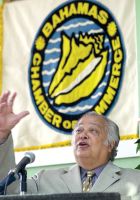The Bahamas should not allow itself to be pressured by the United States to become a signatory to the Free Trade Agreement of the Americas, a former Commonwealth Secretary-General said Tuesday.
Sir Shridath Ramphal, now Chancellor of the University of the West Indies, and an invited guest of the Bahamas Chamber of Commerce during its monthly business luncheon held at Buena Vista, said Caribbean economies would be placed at a disadvantage, as they are not strong enough to compete with the larger, industrialised nations involved in the initiative.
In fact, “No society in the world is ready,” he said.

FTAA TALKS ヨ Sir Shridath Ramphal, Chancellor of the University of the West Indies addresses the Bahamas Chamber of Commerce monthly business luncheon Tuesday at Buena Vista, on the Free Trade Area of the Americas.
(Staff photo by Donald Knowles)
Sir Shridath told Chamber members that the economies of scale within the Caribbean are not equal to that of economies of countries such as the United States.
Hence, it would be a great disadvantage for The Bahamas and other CARICOM nations to liberalize trade to such an extent without some preferential treatment being given to the region, he said.
“Caribbean countries cannot enter into an arrangement of this kind given our inequalities,” Sir Shridath said. “They must have special and differential treatment for us – for small economies, for weak economies, for poor countries. But of course, that is a mortal sin to the gospel of liberalization. This is a clash between reality and ideology and that still has to be worked out.”
Sir Shridath commended the Bahamas Government for the establishment of the Trade Commission, which he said he met with earlier in the afternoon.
He said that in his view, The Bahamas has taken the lead in the region with the establishment of the commission, as it will serve as an interlink with the Government and the people on such a vital issue.
He also observed that “The Bahamas is almost alone” in “properly” attempting to revitalize agriculture.
Should The Bahamas sign up with the FTAA, he said, the nation would be subject to regulating its domestic laws to comply with international obligations and policies.
“We are entering a new imperial age and the traditions of the United States are too great in internationalism for it to be a creature of so fundamental a change,” he said.
“The FTAA is coming upon us much quicker than we expected,” he said, adding that although it should come into effect in 2005, negotiations should be completed by the middle of 2004.
However, he said, the Caribbean should move toward solidifying its relationship with the World Trade Organization first, before attempting to become a signatory to the FTAA.
Within the WTO, he said, lies the global framework of international trade.
Joining the FTAA first, he said, is somewhat backwards, as nations within the region would be entering into such an agreement hanging in the balance by themselves.
Nations within the region must be strong in their negotiations through unity, he said.
All of our services will be infiltrated as part of trade liberalization, he said, explaining that as the Bahamas has not yet signed the CARICOM agreement to join the Single Market Economy which would open the doors to fellow West Indians, to join the FTAA would mean taking a much bigger bite out of our local economy.
Sir Shridath said that not enough time was given to fully analyze, negotiate and investigate the system of the FTAA, although the pact was first signed in 1995.
He said that a 10-15 year window should have been given.
The Bahamas and other Caribbean nations need the time to secure their interest securely, as our independence has been nurtured too much for it to be put at such a risk, he said.
“I do not think that we are ready in many of the issues that the FTAA comprises – competition policy, government procurement. Are we ready in these areas – international property rights? Some of us haven’t even gotten the laws at the national level to deal with these issues and we’re gonna enter into the FTAA next year?” he asked.
“No I don’t think we’re ready. We’re not asking for a handout, and we’re not going to sign anything that seems popular but is fundamentally opposed to our interests,” Sir Shridath said.
“It’s a big, big, task and quite frankly, I do not believe we are ready for it,” he said. “I do not think that it is open to us. But I do think it is open to us to say hold on, why are you rushing so much? To take this thing seriously, we want to do it properly. We want to secure our interests properly and we’re not ready. But to do that, you can’t do it alone.”
By Vanessa C. Rolle, The Nassau Guardian



